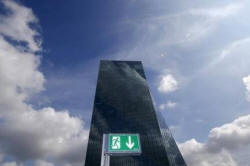|
The
bank is buying 60 billion euros worth of assets each month,
hoping to boost prices and growth after a brief bout of
deflation and expectations that price growth would take years to
rise back to the ECB's target of just below 2 percent.
"Developments in the world economy and commodity markets have
increased the downside risk to achieving the sustainable
inflation path towards 2 percent; the risk has increased,"
Executive Board member Peter Praet told reporters on the
sidelines of a conference.
"There should be no ambiguity on the willingness and ability of
the governing council to act if needed," said Praet, who is also
the bank's chief economist. "The PSPP (public sector purchase
program) provides sufficient flexibility to do so in terms of
size, composition and length of the program."
Crude oil prices <LCOc1> have fallen to $43 per barrel from over
$110 per barrel last June while iron ore price <.IO62-CNI=SI>
are near historic lows on expectations that Chinese growth will
continue to slow, hitting its lowest level in two decades.
Praet said emerging market growth was weakening and the output
gap in some emerging markets was widening, a marginal challenge
for the euro zone but still a potential headwind.
He added that the ECB would have to weigh the consequences of
higher market volatility on financing conditions.
"From a monetary policy perspective, we will have to think about
the consequence on the pricing of risk as markets will somehow
incorporate this volatility behavior into the pricing of risk
and we have to understand what the consequences are on financial
conditions in general," he said.
(Reporting by Balazs Koranyi and Francesco Canepa; Editing by
Mark Heinrich and Gareth Jones)
[© 2015 Thomson Reuters. All rights
reserved.] Copyright 2015 Reuters. All rights reserved. This material may not be published,
broadcast, rewritten or redistributed. |
|





